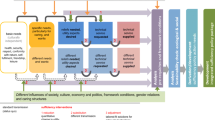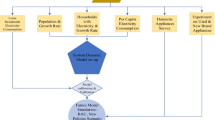Abstract
In The Netherlands, the only energy carriers playing a significant role in households are natural gas and electricity. Natural gas is mainly used for space heating, hot water production and cooking, whereas electricity is used for appliances and lighting. Prognoses indicate that the total residential electricity consumption will rise continuously. In this paper, the impact of policy instruments on the development of electricity consumption in the Netherlands is investigated. First, a brief overview of policy efforts over the last two decades is given. It appears that the main focus of these policy instruments is on restricting the natural gas consumption rather than electricity consumption. Next, recent policy initiatives are discussed. Special attention is given to the effects of energy rebates granted on A-labelled appliances. The subsidy effectiveness as well as the total impact on CO2 emissions are determined by means of model calculations. Finally, some remarks are made with respect to the feasibility and unfeasibility for limiting the growth of electricity consumption. Part of the factors responsible for the growth of the residential electricity consumption, such as disposable income, composition of population and life style factors, are beyond the reach of policy makers. However, the energy labelling system offers some good opportunities on condition that it is upgraded regularly. Nevertheless, even at best it is unlikely that the labelling of appliances solely will be able to bring about a turnover in the growth of residential electricity consumption.
Access this chapter
Tax calculation will be finalised at checkout
Purchases are for personal use only
Preview
Unable to display preview. Download preview PDF.
Similar content being viewed by others
References
Antonides G.A., W.F. van Raaij. Stuurbaarheid van milieu-relevant consumentengedrag. Erasmus University, Rotterdam, the Netherlands, in Dutch 1998.
AE. Issue 1, volume 4, 2000. Appliance Efficiency, Newsletter of IDEA, the International Network for Domestic Energy-Efficient Appliances, page 10, 1999.
Boonekamp P.G.M. SAVE-Module Huishoudens. De modellering van energieverbruiksontwikkelingen. ECN, Netherlands Energy Research Foundation, report nr. ECN—C-94-045, Petten, the Netherlands, in Dutch, 1994.
Boonekamp P.G.M. and H. Jeeninga. Gedrag en Huishoudelijk Elektriciteitsverbruik. Kwalitatieve en kwantitatieve analyse 1980 — 1997. Netherlands Energy Research Foundation (ECN), report no. ECN-C-99–057, Petten, the Netherlands, in Dutch, 1999.
Boonekamp P.G.M., H. Jeeninga and H. Heinink. Effectiviteit Energiepremies. Analyse voor het Huishoudelijk Verbruik tot 2010. Netherlands Energy Research Foundation (ECN), report no. ECN-C-2000–062, Petten, the Netherlands, in Dutch, 2000.
CPB. Economie en fiisieke omgeving; beleidsopgaven enoplossingsrichtingen 1995-2020. Netherlands Bureau for Economic Policy Analysis (CPB), The Hague, in Dutch,1997.
ECN. Nationale Energie Verkenningen 1995 – 2020. Netherlands Energy Research Foundation (ECN), Petten, the Netherlands, in Dutch, 1998.
EnergieNed. Basisonderzoek Elektriciteitsverbruik Kleinverbruikers. Arnhem, the Netherlands, in Dutch, several years.
EnergieNed. EnergieWijzers, diverse jaren. EnergieNed, Arnhem, 1999.
EP. Energy-plus. http://www.energy-plus.org/, april 2000.
Jeeninga H. Analyse Energieverbruik sector Huishoudens 1982 – 1996, Achtergronddocument by het rapport Monitoring Energieverbruik en Beleid Nederland. ECN, Netherlands Energy Research Foundation, report nr. ECN–1–97–051, Petten, the Netherlands, in Dutch, 1997.
Jeeninga H., Domestic Appliances and Life Style. Consequences for domestic electricity consumption in 2010, Report prepared for Novem, Sittard, the Netherlands, 1998.
Ministry of Economic Affairs, Action Programme Energy Conservation 1999–2002, Den Haag, June 1999.
Waide P., Monitoring of energy efficiency trends of European domestic refrigeration appliances: final report. Manchester, United Kingdom, 1998.
Winward J., P. Schiellerup, B. Boardman, Cool labels, The first three years of the European Energy Label, Oxford, Environmental Change Unit, University of Oxford, 1998.
Author information
Authors and Affiliations
Editor information
Editors and Affiliations
Rights and permissions
Copyright information
© 2001 Springer-Verlag Berlin Heidelberg
About this paper
Cite this paper
Jeeninga, H., Uyterlinde, M.A. (2001). The Sky is the Limit! Or Why Can More Efficient Appliances Not Decrease the Electricity Consumption of Dutch Households. In: Bertoldi, P., Ricci, A., de Almeida, A. (eds) Energy Efficiency in Household Appliances and Lighting. Springer, Berlin, Heidelberg. https://doi.org/10.1007/978-3-642-56531-1_84
Download citation
DOI: https://doi.org/10.1007/978-3-642-56531-1_84
Publisher Name: Springer, Berlin, Heidelberg
Print ISBN: 978-3-540-41482-7
Online ISBN: 978-3-642-56531-1
eBook Packages: Springer Book Archive




